Obama's Stocks and Bonds Bear Market
Stock-Markets / Financial Markets 2009 Mar 07, 2009 - 07:50 AM GMT

 The Employment Situation? Grim - Nonfarm payroll employment continued to fall sharply in February (-651,000), and the unemployment rate rose from 7.6 to 8.1 percent, the Bureau of Labor Statistics of the U.S. Department of Labor reported today. Payroll employment has declined by 2.6 million in the past 4 months. In February, job losses were large and widespread across nearly all major industry sectors.
The Employment Situation? Grim - Nonfarm payroll employment continued to fall sharply in February (-651,000), and the unemployment rate rose from 7.6 to 8.1 percent, the Bureau of Labor Statistics of the U.S. Department of Labor reported today. Payroll employment has declined by 2.6 million in the past 4 months. In February, job losses were large and widespread across nearly all major industry sectors.
Even $9.00 an hour jobs are being filled by older applicants and high paying jobs are lost. Retail jobs are disappearing at a faster rate in this recession than in any other since the U.S. government began keeping track in 1939.
From the “We could see this coming” category,
Senate Banking Committee Chairman Christopher Dodd is moving to allow the Federal Deposit Insurance Corp. to temporarily borrow as much as $500 billion from the Treasury Department.
Last week, the FDIC proposed raising fees on banks in order to build up its deposit insurance fund, which had just $19 billion at the end of 2008. That idea provoked protests from banks, which said such a burden would worsen their already shaken condition. The Dodd bill, if it becomes law, would represent an alternative source of funding.
It appears that the only entity that isn't broke yet is the government.
Obama's Bear Market.
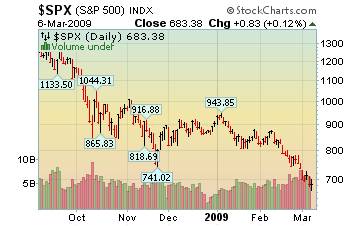 -- The Dow Jones Industrial Average has fallen 20 percent since Inauguration Day, the fastest drop under a newly elected president in at least 90 years, according to data compiled by Bloomberg. The gauge has lost 53 percent from its October 2007 record of 14,164.53, slipping 4.1 percent to 6,594.44 yesterday. More than $1.6 trillion has been erased from U.S. equities since Jan. 20 as mounting bank losses and rising unemployment convinced investors the recession is getting worse.
-- The Dow Jones Industrial Average has fallen 20 percent since Inauguration Day, the fastest drop under a newly elected president in at least 90 years, according to data compiled by Bloomberg. The gauge has lost 53 percent from its October 2007 record of 14,164.53, slipping 4.1 percent to 6,594.44 yesterday. More than $1.6 trillion has been erased from U.S. equities since Jan. 20 as mounting bank losses and rising unemployment convinced investors the recession is getting worse.
Treasuries are struggling with a potential oversupply.
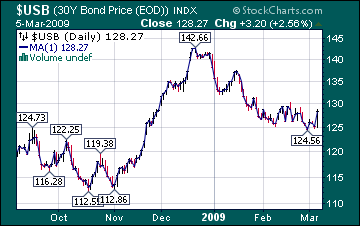 -- Treasuries fell this morning as traders focused on the $63 billion in notes and bonds to be sold next week after a government report showed the economy shed jobs and unemployment climbed to the highest level in more than 25 years.
-- Treasuries fell this morning as traders focused on the $63 billion in notes and bonds to be sold next week after a government report showed the economy shed jobs and unemployment climbed to the highest level in more than 25 years.
Government debt has handed investors a 2.5 percent loss so far this year as the U.S. embarks on the sale of more than $2 trillion in debt to steer the nation out of recession.
Gold is giving back hard-earned gains.
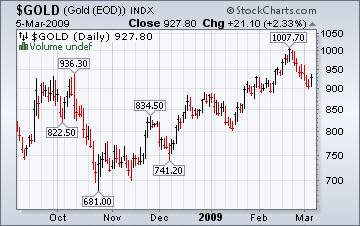 ( Bloomberg ) -- Some investors have become concerned about possible future inflation as governments and central banks spend trillions of dollars and lower interest rates in an effort to rescue financial companies and revive economies. Those steps have yet to help the U.S. economy, the world's largest, to revive growth or stem job cuts as companies seek to reduce costs in response to tumbling sales. As long as the economy is flat on its back, inflation may not have the effect that is anticipated.
( Bloomberg ) -- Some investors have become concerned about possible future inflation as governments and central banks spend trillions of dollars and lower interest rates in an effort to rescue financial companies and revive economies. Those steps have yet to help the U.S. economy, the world's largest, to revive growth or stem job cuts as companies seek to reduce costs in response to tumbling sales. As long as the economy is flat on its back, inflation may not have the effect that is anticipated.
Japanese sentiment a sign that they are near a bottom?
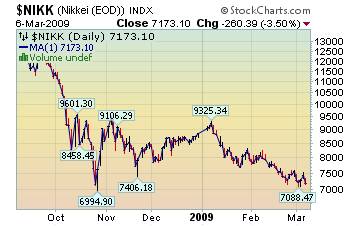 Japanese stocks retreated, extending a weekly decline, on concern a shortage of funds could spark collapses in the automotive and electronics industries. “Investors are getting more and more worried about businesses' survival as the end of the fiscal year draws near,” said Yoshihiro Ito , senior strategist at Tokyo-based Okasan Asset Management Co., which oversees about $9.3 billion. “The deterioration of Japan's economy is way beyond that of other nations, and the market has entered a tunnel with no exit.”
Japanese stocks retreated, extending a weekly decline, on concern a shortage of funds could spark collapses in the automotive and electronics industries. “Investors are getting more and more worried about businesses' survival as the end of the fiscal year draws near,” said Yoshihiro Ito , senior strategist at Tokyo-based Okasan Asset Management Co., which oversees about $9.3 billion. “The deterioration of Japan's economy is way beyond that of other nations, and the market has entered a tunnel with no exit.”
The Shanghai Index optimistic prospects may be dimming.
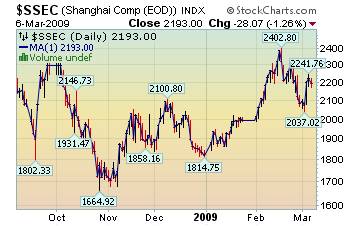 -- China's stocks fell, paring the benchmark index's weekly gain, as commodity producers and shipping lines slid on concern stimulus spending won't be enough to offset the collapse in the nation's exports. Collapsing exports have dragged China, the world's third- largest economy, to its weakest growth in seven years. Optimism government stimulus spending will revive growth has driven the Shanghai Composite 20 percent higher this year, the best performer among 91 global stock gauges tracked by Bloomberg.
-- China's stocks fell, paring the benchmark index's weekly gain, as commodity producers and shipping lines slid on concern stimulus spending won't be enough to offset the collapse in the nation's exports. Collapsing exports have dragged China, the world's third- largest economy, to its weakest growth in seven years. Optimism government stimulus spending will revive growth has driven the Shanghai Composite 20 percent higher this year, the best performer among 91 global stock gauges tracked by Bloomberg.
The dollar is due for a pullback,
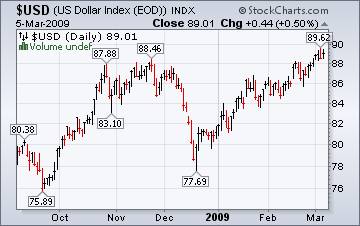 -- The dollar fell against the euro and the yen before a government report that may show the U.S. lost the most jobs last month since 1949.
-- The dollar fell against the euro and the yen before a government report that may show the U.S. lost the most jobs last month since 1949.
The U.S. currency weakened for a second day against the yen before the Labor Department report, which may show the unemployment rate rose in February to a 25-year high as payrolls fell by 650,000.
Housing plan “kicking the can down the road.”.
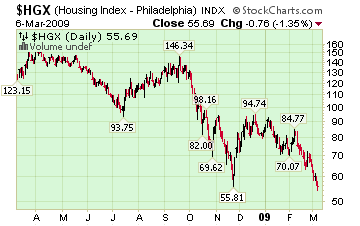 The Obama administration yesterday sketched in the details of its most ambitious attempt to reduce foreclosures and stabilize the beleaguered housing market at the root of the economic meltdown. The program has two key elements: a refinancing program for borrowers with little equity in their homes but current on their loans, and a $75 billion program to help reduce mortgage payments for struggling borrowers. Unfortunately, it does not address that most homeowners who are in trouble have negative equity. This plan carries more hope than substance.
The Obama administration yesterday sketched in the details of its most ambitious attempt to reduce foreclosures and stabilize the beleaguered housing market at the root of the economic meltdown. The program has two key elements: a refinancing program for borrowers with little equity in their homes but current on their loans, and a $75 billion program to help reduce mortgage payments for struggling borrowers. Unfortunately, it does not address that most homeowners who are in trouble have negative equity. This plan carries more hope than substance.
You've got oil!
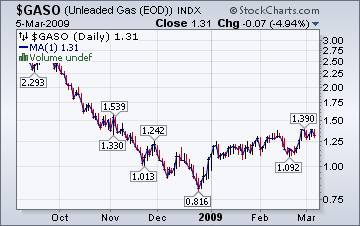 The Energy Information Administration tells us about a relatively recent discovery of shale oil in the Western States. “The Bakken Formation contains a major onshore unconventional oil resource in Montana, North Dakota, and Saskatchewan, Canada. The Bakken shales produce a light oil that is generally desirable because it offers a high yield of gasoline and other key petroleum products. Proved oil reserves in Montana and North Dakota grew from 831 million barrels in 2006 to 892 million barrels in 2007.”
The Energy Information Administration tells us about a relatively recent discovery of shale oil in the Western States. “The Bakken Formation contains a major onshore unconventional oil resource in Montana, North Dakota, and Saskatchewan, Canada. The Bakken shales produce a light oil that is generally desirable because it offers a high yield of gasoline and other key petroleum products. Proved oil reserves in Montana and North Dakota grew from 831 million barrels in 2006 to 892 million barrels in 2007.”
A lack of drawdown is keeping gas supplies high.
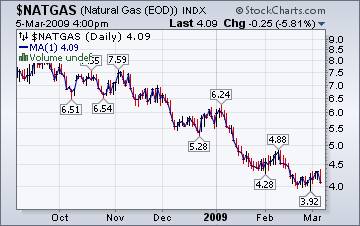 The Energy Information Agency's Natural Gas Weekly Update reports that a late winter cold spell in the lower 48 states and a winter storm in the east has temporarily boosted natural gas prices. But the drawdown of 102 billion cubic feet (BCF) was less than the prior 5 year average of 121 BCF and smaller than the 139 BCF drawdown last year.
The Energy Information Agency's Natural Gas Weekly Update reports that a late winter cold spell in the lower 48 states and a winter storm in the east has temporarily boosted natural gas prices. But the drawdown of 102 billion cubic feet (BCF) was less than the prior 5 year average of 121 BCF and smaller than the 139 BCF drawdown last year.
Are our banks worth saving?
Our politicians want to blame our banking problems on the greedy executives. There is plenty of blame that can be pointed there. However, our financial system has been rigged by a maze of laws and regulations that has flawed the system so badly that it may not be worth saving. Michael Rozeff of LewRockwell.com has written an article that may help understand why the current system may not be worth saving.
Ground zero of the economic depression is the banking system – worldwide. The system is collapsed, exploded, demolished, gone, ruined, kaput. The global banking system was a house of cards, and it has fallen. Governments and central banks everywhere do not yet realize this. They are attempting to rebuild the house from the pieces and scraps scattered far and wide. Better to salvage the pieces that still work and use them in an entirely new system than attempt to rebuild this one on the same cracked foundation and along the same flawed lines that produced this wreck.
Our Investment Advisor Registration is on the Web .
We are in the process of updating our website at www.thepracticalinvestor.com to have more information on our services. Log on and click on Advisor Registration to get more details.
If you are a client or wish to become one, please make an appointment to discuss our investment strategies by calling Connie or Tony at (517) 699-1554, ext 10 or 11. Or e-mail us at tpi@thepracticalinvestor.com .
Anthony M. Cherniawski,
President and CIO
http://www.thepracticalinvestor.com
As a State Registered Investment Advisor, The Practical Investor (TPI) manages private client investment portfolios using a proprietary investment strategy created by Chief Investment Officer Tony Cherniawski. Throughout 2000-01, when many investors felt the pain of double digit market losses, TPI successfully navigated the choppy investment waters, creating a profit for our private investment clients. With a focus on preserving assets and capitalizing on opportunities, TPI clients benefited greatly from the TPI strategies, allowing them to stay on track with their life goals
Disclaimer: The content in this article is written for educational and informational purposes only. There is no offer or recommendation to buy or sell any security and no information contained here should be interpreted or construed as investment advice. Do you own due diligence as the information in this article is the opinion of Anthony M. Cherniawski and subject to change without notice.
Anthony M. Cherniawski Archive |
© 2005-2022 http://www.MarketOracle.co.uk - The Market Oracle is a FREE Daily Financial Markets Analysis & Forecasting online publication.


